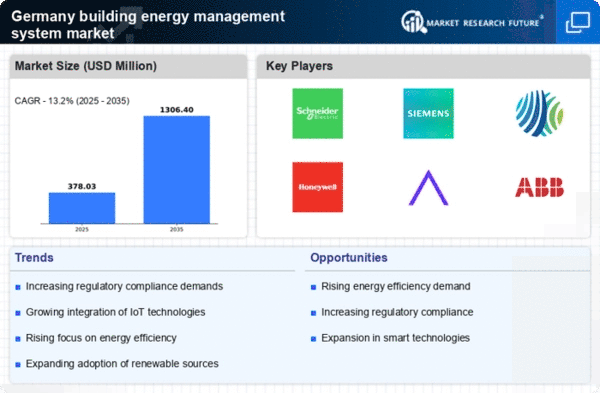Rising Energy Costs
The escalating energy costs in Germany are a primary driver for the building energy management system market. As energy prices continue to rise, businesses and homeowners are increasingly seeking solutions to optimize energy consumption. The building energy-management-system market provides tools that enable users to monitor and control energy usage effectively. In 2025, energy costs are projected to increase by approximately 15%, prompting a shift towards energy-efficient technologies. This trend indicates a growing demand for systems that can provide real-time data and analytics, allowing users to make informed decisions about their energy consumption. Consequently, the building energy-management-system market is likely to experience significant growth as stakeholders prioritize cost-saving measures and sustainability initiatives.
Increased Urbanization
The trend of urbanization in Germany is driving the demand for building energy-management systems. As more people move to urban areas, the need for efficient energy management in densely populated buildings becomes critical. Urban centers are experiencing a surge in construction and renovation projects, which often incorporate energy-efficient technologies. the building energy management system market is positioned to benefit from this trend, as these systems are essential for managing energy consumption in large buildings and complexes. By 2025, urban areas are expected to account for over 80% of Germany's energy consumption, highlighting the importance of effective energy management solutions in urban planning and development.
Technological Advancements
The rapid advancement of technology is significantly influencing the building energy management system market. Innovations in IoT, AI, and machine learning are enabling more sophisticated energy management solutions. These technologies allow for predictive analytics, automated controls, and enhanced user interfaces, making energy management more accessible and efficient. In 2025, it is estimated that the integration of AI in energy management systems could improve energy efficiency by up to 30%. This potential for enhanced performance is likely to attract more users to the building energy-management-system market, as organizations seek to leverage these advancements to optimize their energy usage and reduce operational costs.
Government Sustainability Goals
Germany's commitment to sustainability and climate change mitigation is a crucial driver for the building energy management system market. The government has set ambitious targets to reduce greenhouse gas emissions by 55% by 2030 compared to 1990 levels. This regulatory framework encourages the adoption of energy-efficient technologies in buildings. The building energy-management-system market plays a vital role in helping organizations meet these sustainability goals by providing solutions that enhance energy efficiency and reduce carbon footprints. As businesses strive to comply with these regulations, the demand for advanced energy management systems is expected to rise, fostering innovation and investment in the sector.
Corporate Sustainability Initiatives
Many corporations in Germany are increasingly adopting sustainability initiatives as part of their corporate social responsibility strategies. This shift is driving the demand for building energy-management systems, as companies seek to reduce their environmental impact and improve energy efficiency. The building energy-management-system market provides tools that help organizations track their energy usage and implement strategies to minimize waste. In 2025, it is anticipated that over 60% of large corporations will have integrated energy management systems into their operations. This trend suggests a growing recognition of the importance of sustainability in business practices, further propelling the growth of the building energy management system market.
















